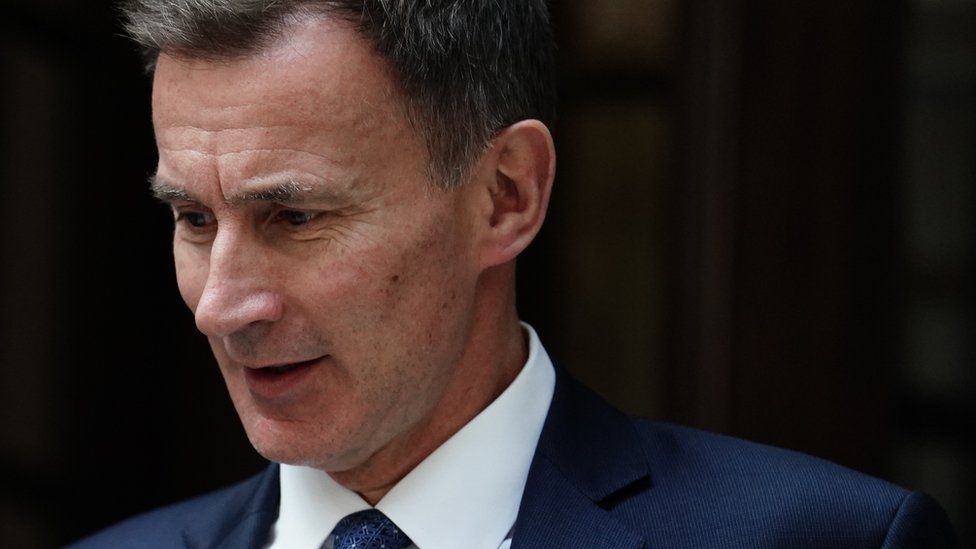Blood
Hunt says bill for infected blood compensation may be very large
Final compensation for victims of the infected blood scandal could end up costing “very, very large sums of money,” the chancellor has said.
Former health secretary Jeremy Hunt was giving evidence to the public inquiry into what has been labelled the worst treatment disaster in NHS history.
He said the government had accepted the moral case for compensation.
But he said no final decisions could be made before the inquiry publishes its findings later this year.
It is thought nearly 30,000 people in the UK were given contaminated blood products in the 1970s and ’80s.
Some 4,500 victims, and some bereaved partners, receive ongoing financial support and – in October 2022 – also received the first interim compensation payment of £100,000 each.
In April, the inquiry recommended the government should establish an “independent, arm’s length” body as soon as possible to pay full compensation to the victims, along with others whose lives have been impacted, such as the victims’ children and parents.
Mr Hunt said he was “absolutely content” that the government had been acting “very fast” to resolve the issue with officials, holding about 50 meetings this year alone.
During questioning, he was asked about a series of newspaper articles published this year, some quoting treasury officials, which estimate the final bill for compensation at between £5bn and £20bn.
Mr Hunt described those leaks as “unwelcome”, saying the officials responsible “may not be in possession of the full facts”.
He said the Treasury was still conducting detailed work to try and calculate the potential cost to the taxpayer.
“These are potentially very, very large sums of money,” he said.
“It’s a very uncomfortable thing to say, but I can’t ignore the economic and fiscal context – because, in the end, the country only has the money it has.”

When asked by inquiry counsel Jenni Richards KC if he could give any reassurance over the timescale for compensation, Mr Hunt denied the issue was being “kicked into the long grass”.
“I do appreciate that the way government works might seem frustratingly slow, but I am absolutely content we have been acting at pace,” he said.
It is the second time Mr Hunt, who served as health secretary from 2012-18, has given evidence to the inquiry, which was established by then-Prime Minister Theresa May in 2017.
Another ex-health secretary, Labour’s Andy Burnham, has written to Mr Hunt urging him to ensure that a full compensation scheme will be in place by the time the inquiry publishes its final report this autumn.
Mr Hunt said he could not commit to that timetable but understood the victims’ frustration and that of their families, and stressed he hoped to avoid unnecessary delay.
What is the infected blood scandal?
The inquiry was set up to examine how thousands of patients in the UK were infected with HIV and hepatitis B and C some 40 years ago, how authorities – including government – responded when the error became apparent, and whether there was a cover-up.
Thousands of NHS patients became seriously ill after being given a new treatment for haemophilia and other blood disorders – called Factor XIII or IX – from the mid-1970s onwards.
At the time, the medication was imported from the US, where it was made from the pooled blood plasma of thousands of paid donors, including some in high-risk groups, such as prisoners and drug-users.
If a single donor was infected with a blood-borne virus such as hepatitis or HIV, then the whole batch of medication could have been contaminated.
In addition, it is thought thousands of other patients were exposed to hepatitis C via blood transfusions after childbirth or surgery. About 2,900 people are estimated to have died.
- Blood-inquiry families heckle PM over compensation
- Bereaved relatives in government compensation plea
- Infected blood inquiry: Five things we have learned
The families of those affected want Downing Street to respond quickly to the compensation recommendations made by the inquiry, Earlier this week, the group delivered a letter to No 10 asking for urgent action on the payments.
The Haemophilia Society, which represents people with the blood disorder, said it welcomed some of the detail provided by the chancellor in his evidence, but said his evidence stopped short of answering the questions its members had anticipated.
“If compensation is truly a priority for this government, then it will need to match its words with actions and move swiftly to allay the acute anxiety its delays are causing,” said Kate Burt, chief executive of the Haemophilia Society.
Related Topics
- HIV & Aids
- UK contaminated blood inquiry
- Jeremy Hunt
- NHS

